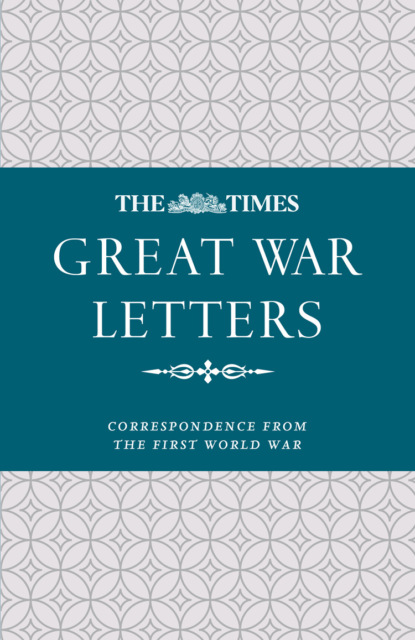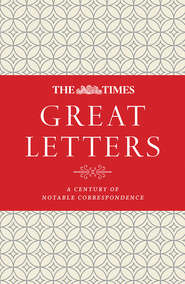По всем вопросам обращайтесь на: info@litportal.ru
(©) 2003-2024.
✖
The Times Great War Letters: Correspondence during the First World War
Автор
Год написания книги
2019
Настройки чтения
Размер шрифта
Высота строк
Поля
The nation will welcome national service because the temper of the nation is different from what it was. Recent events have clearly shown, even to the most phlegmatic, that we are in a perfectly real sense up against the Devil incarnate. What else is it when we are fighting against an enemy who will stop at nothing, however mean and cruel and disgusting—an enemy who will use gas, sink Lusitanias, put arsenic in running streams, and sow disease? Mere abuse won’t tame this Devil or drive him out, but a nation serving will. National Service will be welcomed once the nation learns the truth that thousands of the finest and most gallant lives that the Empire has ever produced are being thrown away because the nation has not yet realized that it is at war.
There is only one way to make the nation realize this fact, and that is by bringing every member of it under the direct orders of the State for one purpose, and one purpose only. Nothing else matters to-day.
Yours faithfully,
MICHAEL FURSE, Bishop of Pretoria
On the day that Furse’s letter was published, Asquith addressed concerns about the progress of the war by reconstituting his government as a coalition, with Lloyd George at the head of a new Ministry of Munitions.
BATTLE SHOCK
26 May 1915
SIR,—YOUR MEDICAL Correspondent, in an article in to-day’s issue, makes kindly reference to the hospital at 10, Palace-green opened for officers suffering from battle shock—due to the foresight of Dr. Maurice Wright. I should like to report progress, as the public were good enough to trust me with £10,000 to start, and run, this hospital, and many people have written since to ask me about it. The hospital, after it became known, has always been full, and so insistent has been the demand for further accommodation that we were compelled to start a second hospital. This was not easy to do in London, as the absolute essentials to successful treatment are complete quiet and isolation. The difficulty was solved by the most generous gift by Mr. R. Leicester Harmsworth, M.P., of his furnished house, Moray Lodge, Campden-hill. The conditions are ideal—a large house standing in lovely grounds of four acres or more. This has now been opened for 33 patients. More than 100 officers have passed through 10, Palace-green, and with but very few exceptions all have recovered from the effects of this shock of battle. Dr. Aldren Turner, acting for the Director-General, has completed an organization so that the officers are sent direct from the front to Palace-green, which has been very helpful towards their recovery. I have money enough to run the two hospitals for nine months more. I feel sure that the public will not allow this work to stop for want of money.
Yours truly,
KNUTSFORD
“THE TIMES” IN THE TRENCHES
CONTENTS BILL RIDDLED WITH GERMAN BULLETS
1 June 1915
A soldier writes from “somewhere in France” under date May 25:—
Knowing that the German Press were rather dilatory with the news, we took the liberty of hanging your bill of 21st, “Italy Declares for War,” over the front of our trench breastwork, where it could be read with ease by about 1,000 yards of German lines. Never did your news get such a cutting up. The board was riddled with shot, but after 24 hours it is still readable. We carried that board about seven miles to let them have the truth, and if you will let us have a good “leader” on your bill we’ll be pleased to repeat the dose as it’s sure to have a good effect.
A BLACKSMITH’S OFFER
5 June 1915
SIR,—I HAVE BEEN a subscriber for a daily copy of your valuable paper since the price came within the limits of a working man’s weekly wage. Being blacksmith to trade, I am deeply concerned about how I can be made use of at the present time. For 20 years I was employed between two of the largest locomotive engine builders in Glasgow as angle iron smith, dome maker, flanging and piecing plates, also welding boiler barrels, and lately for a number of years I have been doing all kinds of general smith work and repairs. Although in my 50th year I am quite able for a good day’s work. Surely I can be of some use in serving my country in this great national crisis. I am willing to do anything or go anywhere if only I can serve and feel that I am of use. I hope some scheme of national service will be put in operation which will include working men like myself, who would be quite able to do their bit and relieve younger men for more active service.
A WORKING BLACKSMITH
AN ILLUSTRATION
8 June 1915
SIR,—WITHIN THE LAST week the foreman on a farm adjoining mine in Perthshire, who is married and has five children, of which the eldest is eight, has been induced by the recruiting agent and the Government allowances to enlist. It is impossible to replace a man in such a responsible position under present circumstances except by bribing away another farmer’s servant. On his judgment the ingathering of the crops in proper condition largely depends, as well as other work. His enlistment undoubtedly will mean a reduction in the value of the produce of the farm this year and a reduced area under cultivation next year. I ask what is the good of appeals from the Board of Agriculture to farmers to increase the area of land under cultivation if the recruiting authorities are permitted to act in this way. From a national point of view the want of organization of which this incident is an illustration is folly, and if persisted in may be properly described as madness.
Yours faithfully,
ERNEST MOON
BASIL MOON
9 June 1915
SIR,—IT MAY INTEREST many to know that the example of superb bravery, described in the enclosed extract in a letter in The Times of to-day, under the heading “An Officer’s Courage,” was displayed by an officer, the late Sec. Lieutenant Basil Moon (son of Mr. Ernest Moon, K.C., Counsel to the Speaker), who only joined the Army last August.
Yours truly,
ROBSON
The following is the passage to which Lord Robson refers:—
“During the attack, I am sorry to say, I lost two out of my three subalterns (the fourth has not yet returned). Poor old Roy was shot through the body after we had got about half-way, and though we quickly got his wound dressed and moved him back on a stretcher, he died in hospital the same night. Basil was simply magnificent all through; as soon as Roy (who was bomb officer) was wounded, Basil went up to the front and by his coolness and courage helped materially towards the success of the affair, and at last, when all our bombers had been killed and there was just the chance that the Germans might bomb us back again before we could block the trench, he picked up a rifle and ran along their parapet, picking off the German bombers until an exploding bomb blew the lower half of his face off. Even then he had sufficient strength left and sufficient thoughtfulness to write me a note and send it by messenger saying that he was sorry he was ‘out of action.’ Poor old chap, he was full of pluck right to the end.”
THE MOBILIZATION OF INVENTION
11 June 1915
SIR,—WE HAVE RECONSTRUCTED our Government and it is not for an innocent Englishman outside the world of politicians to estimate the advantages and disadvantages of the rearrangement of the House of Commons. But there is a matter beyond the range of party politics which does still seem to need attention and which has been extraordinarily disregarded in all the discussion that has led to the present Coalition, and that is the very small part we are still giving the scientific man and the small respect we are showing scientific method in the conduct of this war. I submit that there is urgent need to bring imaginative enterprise and our utmost resources of scientific knowledge to the assistance of the new-born energies of the Coalition; that this is not being done and that until it is done this war is likely to drag on and be infinitely more costly and infinitely less conclusive than it could and should be.
Modern war is essentially a struggle of gear and invention. It is not war under permanent conditions. In that respect it differs completely from pre-Napoleonic wars. Each side must be perpetually producing new devices, surprising and outwitting its opponent. Since this war began the German methods of fighting have been changed again and again. They have produced novelty after novelty, and each novelty has more or less saved their men and unexpectedly destroyed ours. On our side we have so far produced hardly any novelty at all, except in the field of recruiting posters. It is high time that our rulers and our people came to recognize that the mere accumulation of great masses of young men in khaki is a mere preliminary to the prosecution of this war. These masses make the body of an army, but neither its neck, head, nor hands, nor feet. In the field of aviation, for which the English and French temperaments are far better adapted than the German, there has been no energy of organization at all. There has been great individual gallantry and a magnificent use of the sparse material available, but no great development. We have produced an insufficient number of aviators and dribbled out an inadequate supply of machines. Insufficient and inadequate, that is to say, in relation to such a war as this. We have taken no steps to produce a larger and more powerful aeroplane capable of overtaking, fighting, and destroying a Zeppelin, and we are as far as ever from making any systematic attacks in force through the air. Our utmost achievements have been made by flights of a dozen or so machines. In the matter of artillery the want of intellectual and imaginative enterprise in our directors has prevented our keeping pace with the German improvements in trench construction; our shortness of high explosives has been notorious, and it has led to the sacrifice of thousands of lives. Our Dardanelles exploit has been throughout unforeseeing and uninventive; we have produced no counterstroke to the enemy’s submarine, and no efficient protection against his improved torpedoes. We have still to make an efficient use of poison gas and of armoured protection in advances against machine-guns in trench warfare. And so throughout almost the entire range of our belligerent activities we are to this day being conservative, imitative, and amateurish when victory can fall only to the most vigorous employment of the best scientific knowledge of all conceivable needs and material.
One instance of many will serve to show what I am driving at. Since this war began we have been piling up infantry recruits by the million and making strenuous efforts to equip them with rifles. In the meantime the actual experiences of the war have been fully verifying the speculations of imaginative theorists, and the Germans have been learning the lesson of their experiences. The idea that for defensive purpose one well-protected skilled man with a small machine-gun is better than a row of riflemen is a very obvious one indeed, but we have disregarded it. The Germans are giving up the crowding of men for defense purposes (though the weakness of the national quality obliges them still to mass for attacks), and they are entrusting their very small and light machine-guns in many cases to officers. They have, in fact, adopted as their 1915 model of trench defence the proper scientific thing. Against this we fire out shrapnel and hurl our infantry.
Now these inadequacies are not incurable failures. But they are likely to go on until we create some supplementary directive force, some council in which the creative factors in our national life, and particularly our scientific men and our younger scientific soldiers and sailors, have a fuller representation and a stronger influence than they have in our present Government. It is not the sort of work for which a great legal and political career fits a man. That training and experience, valuable as it is in the management of man and peoples, does indeed very largely unfit men for this incessantly inventive work. A great politician has no more special aptitude for making modern war than he has for diagnosing diseases or planning an electric railway system. It is a technical business. We want an acting sub-Government of scientific and technically competent men for this highly specialized task.
Such a sub-Government does in effect exist in Germany. It is more and more manifest that we are fighting no longer against that rhetorical system of ancient pretensions of which the Kaiser is the figure-head. In Flanders we are now up against the real strength of Germany; we are up against Westphalia and Frau Krupp’s young men. Britain and France have to get their own brilliant young engineers and chemists to work against that splendid organization. Unless our politicians can add to the many debts we owe them, the crowning service of organizing science in war more thoroughly than they ever troubled to do it in peace, I do not see any very great hope of a really glorious and satisfactory triumph for us in this monstrous struggle.
Very sincerely yours,
H. G. WELLS
THE NEXT GENERATION
22 June 1915
SIR,—AS A SLUM WORKER and member of an L.C.C. Care Committee may I crave space for a few burning words? No one who has at heart the moral and physical welfare of the next generation can witness without dismay the appalling increase of “drinking” amongst the women of the poorest class. Let anyone who doubts this look at the unprecedented number of cases of women had up for drunkenness in our London Police Courts. The money which the Government is pouring out so lavishly upon soldiers’ and sailors’ dependents is in many instances being shockingly and shamefully wasted. There are many families who go dinnerless on Mondays, when the women draw their pay and often remain in the publichouse from 11 a.m. till late in the afternoon. A young soldier’s wife who was explaining the black eye she had got the day before told me that it was not that she cared for the drink, but the “company” and the “treating.” She had recently been troubled by a visit from the S.P.C.C. Another, who before her husband went away was considered a respectable woman, is now doing two months’ hard labour, and I have had to help toward the support of her six little children. Scores of working men who are themselves moderate drinkers have said to me, “Why don’t they close the pubs?” If the sale of drink can be limited to help on the output of munitions why not also for the moral and physical welfare of the mothers and the coming generation?
I am yours faithfully,
A SLUM PARSON
PICTURE PALACES
5 July 1915
SIR,—IF THE WAR LOAN is to have any chance with the “working class,” at least in the Midlands, the compulsory closing of picture palaces will become an absolute necessity. These are probably a more serious menace to the nation now than even drink. With the opening of the National Register there need be no hardship to those employed at the picture shows. But there will be a bad shortage on 5s. vouchers so long as the money is spent every week in these places.
Believe me yours, &c.,
“BLACK COUNTRY” VICAR








